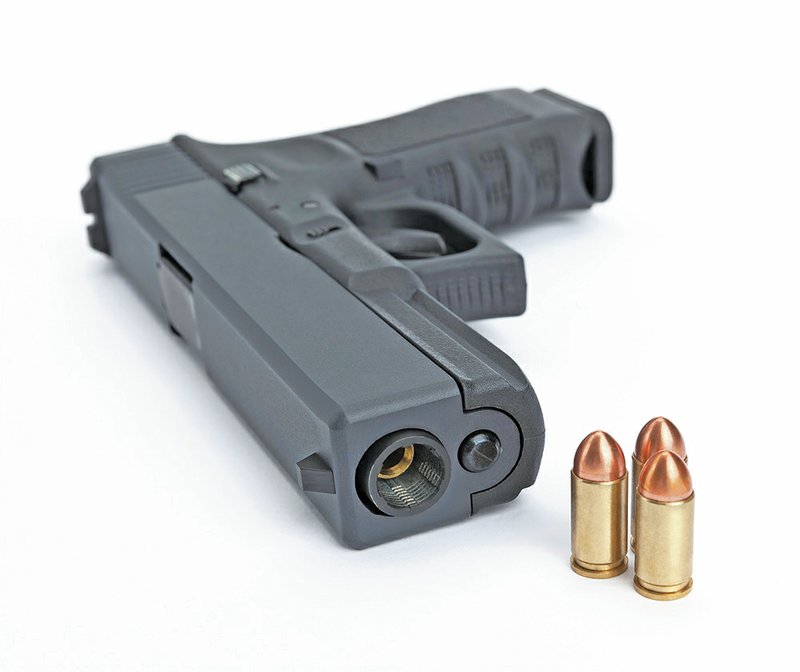BENTONVILLE — A spirited debate broke out Wednesday during a public forum held to discuss NorthWest Arkansas Community College's policy banning guns on campus.
Evelyn Jorgenson, college president, moderated an hourlong discussion at White Auditorium. About 30 students and faculty and staff members attended.
At A Glance
The Opt-Out Decision
NorthWest Arkansas Community College’s board voted 5-1 in May to opt out of Act 226 and keep its campus gun-free. Trustees Amy Forrest, Scott Grigsby, Mauricio Herrera, Geovanny Sarmiento and Mike Shupe voted for the resolution to opt out. Trustee Todd Schwartz cast the only vote against it. Ric Clifford, board chairman, and Dan Shewmaker, a trustee, were absent. Joe Spivey, vice chairman, acted as chairman and therefore didn’t vote.
Source: Staff Report
The Arkansas Legislature last year passed Act 226, which allowed full-time college faculty and staff members to carry concealed handguns on their campuses, presuming they have received the appropriate permit from the state.
But Act 226 also allowed schools to opt out of the rule and maintain gun-free campuses. NorthWest Arkansas Community College, like all other institutions, decided to opt out last year.
Schools wishing to continue opting out must renew their intent to do so through a vote by their governing boards every year.
Wednesday's forum was part of the administration's effort to collect feedback before the board must decide the issue again this spring. No date has been set for that decision.
"We want to listen to your concerns," Jorgenson said.
Bruce Benz, an instructor of emergency management, said though the college has a police force, officers can't be everywhere at once.
"If someone were to come in here and shoot this room up, how long will it take for officers to arrive? A few minutes," Benz said.
Benz said he doesn't favor arming everyone on campus, but having a few extra people who are educated in using guns might prevent a mass shooting.
Doug Krueger, a philosophy professor, said there hasn't been one incident documented where a civilian stopped a shooter.
"I feel our security force is adequate," Krueger said. "They are capable of giving us as much protection as we need."
Krueger added he would feel uncomfortable at an academic institution where "somehow we felt our community was the sort of environment we had to hunker down in a bunker mentality."
Jennifer Burton, a college staff member, noted concealed carry permit holders aren't even allowed to keep guns locked in their cars while on campus. She asked Jorgenson to reconsider that policy so she and others can protect themselves in case they are confronted by a burglar when they arrive home from work.
"I want the ability to protect myself," Burton said. "My concern is at least allow me to carry (the gun) to and from the college in my vehicle."
At least one other audience member echoed that concern. Jorgenson said the idea would be considered.
Bill Black, a student from Bentonville, said people who have gone through the process of obtaining a concealed carry permit should be allowed to exercise that right on campus.
Black said the room they were sitting in had been built to certain specifications so that if a fire broke out, the threat would be minimal.
"Point out to me the firearms safety feature in this room?" Black said.
Diana Portillo, director of veteran resources, said she measured how long it takes for someone to run from the college's police station to her office. It took her 90 seconds. She would feel better about her chances of surviving an armed intruder if she could keep a gun at her side, she said.
Thomas Herrnstein, a philosophy professor, asked how the college's insurance premiums would be affected if the college allowed guns on campus.
Ethan Beckcom, director of emergency and risk management, said when he inquired about that last year, he never got a precise answer. But he said premiums definitely would increase.
Beckcom also spoke about two new safety initiatives the college is developing. One is a smartphone application providing students and staff a panic button to immediately alert security of a threat. That application should be available within two months.
The college also is working on installing panic buttons on all campus phones, he said.
These and other initiatives demonstrate the college is "truly concerned" about safety, Jorgenson said.
The college last year implemented a $1.50 security fee, which is applied to every credit hour a students takes. That fee pays for a certified law enforcement officer and several part-time security officers and to enhance other security measures. The college has about 10 full-time officers who carry guns and others who don't carry guns.
Black said after the forum he was impressed by the way Jorgenson, who's in her first year at the college, handled the event.
"I thought we talked about some important issues," he said. "This is a difficult thing to host."
NW News on 03/06/2014

